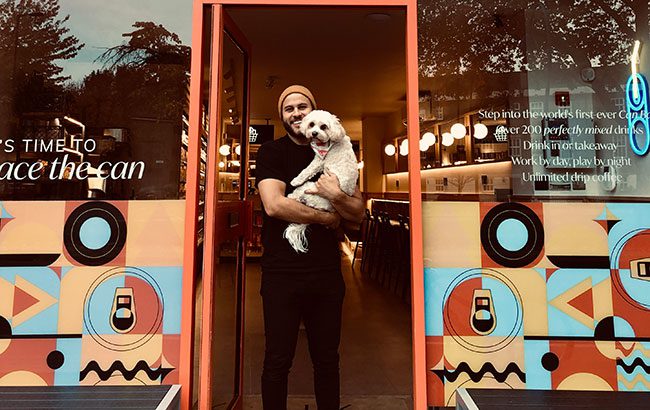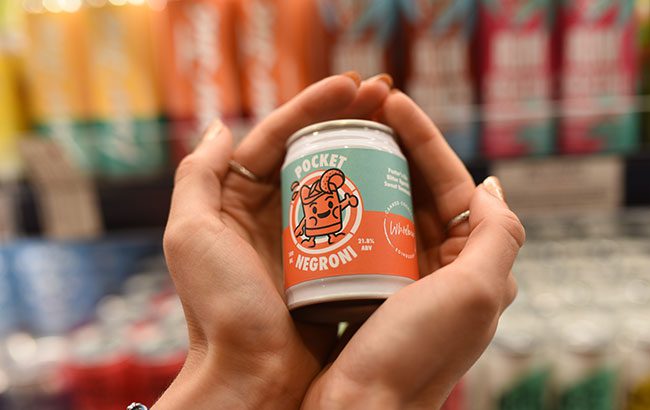Bō Kiri: a new slant on cocktail culture
By Alice BrookerEschewing the fresh fruit, glasses and army of staff needed to run a conventional bar, Kieran Gandhi has opened a venue in London that only sells drinks in cans, and believes it will be a roaring success.

Claiming to be the first of its kind, ready-to-drink (RTD) bar Bō Kiri was launched with high expectations. In November, the venue opened its doors in Peckham Rye, south London, following a five-week construction blitz.
“It’s got this kind of Japanese and Nordic vibe. And Japan for us was a big influence because you’ve got vending machines, it’s very grab-and-go and quick paced,” explains co-founder Kieran Gandhi.
Guests can browse canned drinks and snacks at the front of Bō Kiri, which resembles a Japanese-inspired supermarket. The venue boasts seven metres of fridges, which display 250 brands of “beautifully designed drinks”, divided into categories: Softs, Low-and-No, Beer, Cider and Mead, Hard Seltzers, Cocktails, Spirit and Mixer, and Wine and Fizz.
“Every single one I have tasted, and absolutely recommend,” Gandhi says.
Creating a new channel
After paying at the till, drinkers are able to relax in the mood-lit, Nordic-style seated bar area, with or without one of the board games on offer. “We’re trying to create a whole new channel of hospitality. We’re not saying don’t go to restaurants, bars and pubs. This is just casual, quick, fun, affordable and sustainable,” Gandhi says.
“People walk in and ask, ‘What is going on?’, and next thing you know, they are sitting at a table with four or five empty cans.”
Bō Kiri stands out as a bar with streamlined staff, and without extravagant pours. However, it prides itself on being able to offer the consumer the same experience you’d find in a regular bar – for half the price.
“We’ve stripped out the number of people needed to run a bar, and all the other waste – that represents a massive saving of operating costs. We’ve passed that saving onto the customer. So you’ll be looking at £3-£6 (US$4-US$8) drinks throughout the whole bar,” explains Gandhi.
All the same, the most popular drinks in the venue are the most expensive. Whitebox, an RTD cocktail brand created by a team of bartenders, has seen its £8 Chipper’s Old Fashioned regularly bundled into Bō Kiri cardboard baskets, and its £5.25 Pocket Negroni has nabbed first place for the most-guzzled canned drink at Bō Kiri.

A key pillar of Bō Kiri’s business model is the minimisation of waste and the promotion of sustainability. The venue avoids selling fresh and perishable items, thereby dodging food disposal. There is also no need for drinks ingredients, ice machines and water taps out front, another tick in the sustainable check box for the bar.
“I’d really put my neck out there and say I’d challenge any bar to be more sustainable than us. There’s no glassware, no limes flown in from Brazil or lemons from Sicily, no mint going in the bin at the end of the day.
“In terms of transporting cans, they are so much lighter, and packed more tightly – the carbon footprint is so much less. Cans are 99.9% recyclable – it’s phenomenal. They can be recycled forever,” Gandhi enthuses.
Supporting good causes
The team at Bō Kiri is also keen to support brands looking to help good causes with their profits, or those that are local independents.
“We love any brand that has another mission, that has a little bit more than just the drink itself. We’re not just a surface-level bar trying to make money. We’re not a big corporation. We want to really put back into what we’re doing locally,” Gandhi says.
“For example, Luv Jus is a brand that donates to LGBTQ+ charities. We also work with Public Spirit. For every drink sold, they provide homeless people with a meal, which we love.”
The bar has even adapted its purpose beyond the evening hours. During the day, it markets itself as a dog-friendly workspace, with £4 unlimited coffee and free wifi. Yet, that’s not to say Gandhi isn’t aware of the potential challenges.
“No one has really gone for it like this – we’re really proud to be the first,” he says.
“But the biggest challenge that we have as a new concept is trying to get away from cheap tinnies on the train, to beautiful glorious drinks in cans that aren’t expensive.”
Bō Kiri is looking to the future with hopeful eyes, as the venue borders Peckham Rye Park, and canned drinks are a known summer drinking staple. With talk of an RTD bicycle-delivery service for nearby customers, rolling out its own branded drinks this summer and launching new outposts, this year is a critical one for the bar.
“We’re not fixed in Peckham; we actually intend to roll these out, do more of them this year,” Gandhi says. “The next outpost will be in London. But I can’t reveal more than that for now. We don’t want to run too fast.”
I ask Gandhi what the future is for the RTD category, with regards to the on-trade and off-trade. “Bō Kiri is the future of the RTD market,” he responds. “I really think our brand will lead the way.”
Related news
Drink flights, dive bars and more: cocktail trends for 2026
